When Lin Jing-jie (林靖傑) turned his lens on novelist Wang Wen-hsing (王文興) for a documentary project, he felt like a novice standing before a martial arts master. He tried to enlist help from other authors in tackling the star of the film, but most “declined the offer with an awed look on their faces,” Lin said.
Those reactions are understandable. Wang, now 72, has earned a reputation as Taiwan’s most abstruse modernist author, despite the fact he has only two major works to his name: Family Catastrophe (家變), which was published in 1973 and is regarded as subversive and groundbreaking in content and form, and the two-volume Backed Against the Sea (背海的人), which was published 25 years later.
The Man Behind the Book (尋找背海的人), Lin’s film about Wang, is part of a six-film series titled The Inspired Island: Series of Eminent Writers From Taiwan (他們在島嶼寫作—文學大師系列電影), for which five directors documented the lives and work of six literary figures, including poets Yu Kuang-chung (余光中), Yang Mu (楊牧), Chou Meng-tieh (周夢蝶) and Cheng Chou-yu (鄭愁予), as well as female writer Lin Hai-yin (林海音).
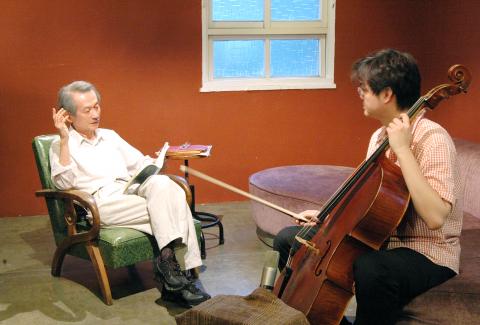
Photo courtesy of Fisfisa
The ambitious project was born of a fire in 2008 that engulfed much of Cloud Gate Dance Theatre’s (雲門舞集) studio in Bali (八里) District, New Taipei City. The blaze prompted Pegatron Corp (和碩) chairman Tung Tsu-hsien (童子賢) to take action to preserve Taiwan’s artistic heritage. Two years of negotiations and more than NT$15 million in funding later, some of Taiwan’s most celebrated literary figures were immortalized on film.
As most of the authors were driving forces in the poetry movement that flourished between 1950 and 1970, the films offer a window into an exciting age in Taiwanese literature. The zeitgeist of the era is reflected through personal histories and anecdotes, and the documentaries serve as references and footnotes to one another, synergistically building up the bigger picture.
In The Man Behind the Book, Lin Jing-jie uses animation and theatrical performances to bring to life Wang’s novels and probe the author’s tempestuous inner world. The documentary, which is easily accessible to those who may not know anything about the author, includes interviews and commentary from young writers.
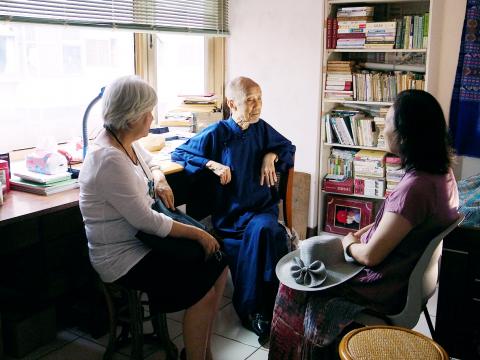
Photo courtesy of Fisfisa
Images of the novelist writing in his cell-like study reveal why Wang produces only 35 characters a day. He lashes out violently on pieces of paper with a pen as if he were sculpting words, not writing them.
It’s telling that the film only shows Wang performing a reenactment of writing in his study; the purist says he can’t work with even the slightest interruption — in this case, a small digital camera on a tripod.
“I held myself in check a little to be photogenic. The reality is 10 times more violent than what you see in the film,” Wang told the audience at a question-and-answer session held after the film’s premiere earlier this month. “I write this way exactly because I can’t write, not even one word, but feel even worse if I don’t write anything at all.”
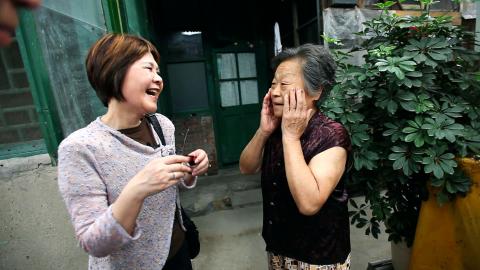
Photo courtesy of Fisfisa
The affable relationship between Lin Jing-jie and Wang is the subject of envy for veteran filmmaker Chen Huai-en (陳懷恩), who spent
a year and half documenting Yu, but was
unable to observe the poet in an up-close and personal manner.
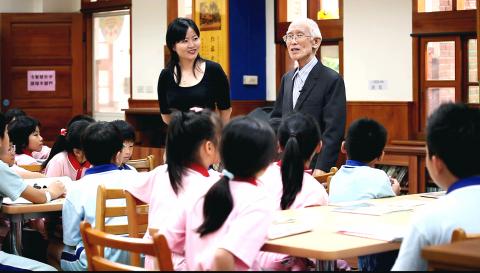
Photo courtesy of Fisfisa
“At his age [82], Yu focuses his energy on his works and cares less about the outside world ... He thought making a documentary would be like an interview that could be done in a day. Most of the time, he would say, ‘Okay, I think that is enough for the day,’” Chen explained.
The fact that Yu is a widely studied poet with more than 50 titles to his name heightened Chen’s anxiety. But the resulting documentary, The Untrammeled Traveler (逍遙遊), presents a refreshing take on the influential figure, who is portrayed as a traveler who longs for home.
For Home in Two Cities (兩地), filmmaker Yang Li-chou (楊力州) faced an even more difficult task as his subject, Lin Hai-yin, passed away in 2001.
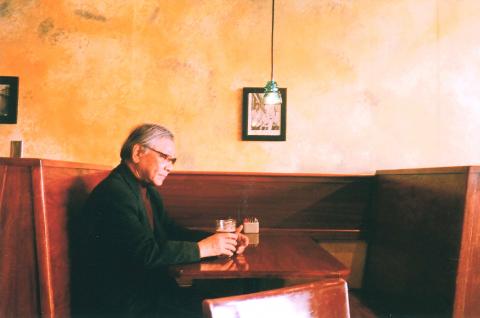
Photo courtesy of Fisfisa
Noted for his narrative-driven documentaries, the director delivers an emotion-packed rendering of the writer and publisher as a doting mother figure who nourished a younger generation of writers and artists including Cloud Gate founder Lin Hwai-min (林懷民) and nativist literature figure Huang Chun-ming (黃春明).
The rest of the series is composed of Wen Chih-i’s (溫知儀) Towards the Completion of a Poem (朝向ㄧ首詩的完成) on poet Yang Mu, Chen Chuan-hsing’s (陳傳興) lyrical Port of Mists (如霧起時), which examines the life of poet Cheng Chou-yu, and The Coming of Tulku (化城再來人), the first biographical documentary on the 90-year-old Chou Meng-tieh.
The series is currently showing at The Ambassador Theatre (國賓影城) at the Spring Center (長春廣場), 176 Changchun Rd, Taipei City (台北市長春路176號). It runs through May 6. Screenings are mostly in Mandarin with Chinese subtitles. For more information, go to fisfisa.pixnet.net/blog.
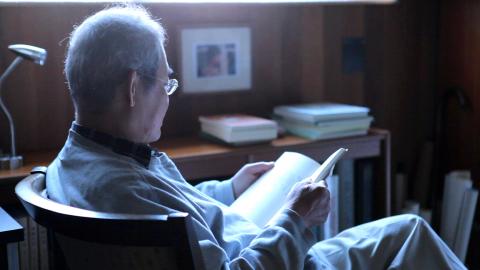
Photo courtesy of Fisfisa

As Taiwan’s second most populous city, Taichung looms large in the electoral map. Taiwanese political commentators describe it — along with neighboring Changhua County — as Taiwan’s “swing states” (搖擺州), which is a curious direct borrowing from American election terminology. In the early post-Martial Law era, Taichung was referred to as a “desert of democracy” because while the Democratic Progressive Party (DPP) was winning elections in the north and south, Taichung remained staunchly loyal to the Chinese Nationalist Party (KMT). That changed over time, but in both Changhua and Taichung, the DPP still suffers from a “one-term curse,” with the

William Liu (劉家君) moved to Kaohsiung from Nantou to live with his boyfriend Reg Hong (洪嘉佑). “In Nantou, people do not support gay rights at all and never even talk about it. Living here made me optimistic and made me realize how much I can express myself,” Liu tells the Taipei Times. Hong and his friend Cony Hsieh (謝昀希) are both active in several LGBT groups and organizations in Kaohsiung. They were among the people behind the city’s 16th Pride event in November last year, which gathered over 35,000 people. Along with others, they clearly see Kaohsiung as the nexus of LGBT rights.

Jan. 26 to Feb. 1 Nearly 90 years after it was last recorded, the Basay language was taught in a classroom for the first time in September last year. Over the following three months, students learned its sounds along with the customs and folktales of the Ketagalan people, who once spoke it across northern Taiwan. Although each Ketagalan settlement had its own language, Basay functioned as a common trade language. By the late 19th century, it had largely fallen out of daily use as speakers shifted to Hoklo (commonly known as Taiwanese), surviving only in fragments remembered by the elderly. In

Dissident artist Ai Weiwei’s (艾未未) famous return to the People’s Republic of China (PRC) has been overshadowed by the astonishing news of the latest arrests of senior military figures for “corruption,” but it is an interesting piece of news in its own right, though more for what Ai does not understand than for what he does. Ai simply lacks the reflective understanding that the loneliness and isolation he imagines are “European” are simply the joys of life as an expat. That goes both ways: “I love Taiwan!” say many still wet-behind-the-ears expats here, not realizing what they love is being an